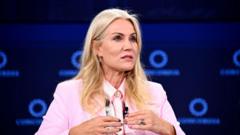Meta's oversight board is raising significant concerns over the company’s recent decision to discontinue its use of third-party fact-checkers on Facebook and Instagram. Co-chair Helle Thorning-Schmidt, a former Prime Minister of Denmark, voiced her worries regarding how this change may adversely affect minority communities, especially the LGBTQ+ population and those advocating for gender and trans rights.
In an interview with BBC Radio 4's Today programme, Thorning-Schmidt acknowledged that while some aspects of the policy shake-up, including the introduction of user-driven "community notes," could be positive moves, the potential consequences of diminished fact-checking are serious. "We are seeing many instances where hate speech can lead to real-life harm, so we will be watching that space very carefully," she stated.
Meta CEO Mark Zuckerberg touted the changes as a return to prioritizing free expression, suggesting that previous fact-checking efforts were politically biased, leading to unnecessary user censorship. This shift has sparked debate over the future of Meta’s oversight board, especially in the wake of Sir Nick Clegg’s recent departure from the company.
Despite the criticism, not everyone disapproves of Meta's new direction. Proponents of free speech, including the US-based group Fire, have praised the decision as a move toward a marketplace of ideas, suggesting that it may lead to a reduction in arbitrary moderation. They assert that the changes could help facilitate freer speech on Meta's platforms.
Conversely, some experts voice their skepticism regarding the motivations behind the changes. Tech journalist Kara Swisher claimed that Zuckerberg's decision seems like a calculated move to align better with the prospective Trump administration, saying it reflects self-interest rather than an authentic commitment to free speech.
Zuckerberg has acknowledged that this strategic pivot could present risks for the platform, admitting it may result in missing harmful content while also allowing innocent posts to remain. Analysts have raised concerns about how these shifts could impact Meta's advertising revenue, especially in the context of increased competition for users and advertisers.
As Meta ventures into this new phase of content moderation, the growing divisions in opinion over its implications reflect the complexities of balancing free expression and the responsible management of harmful content online.























